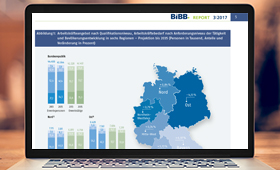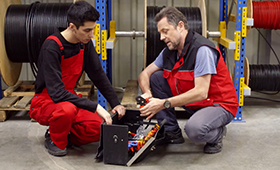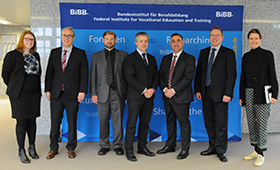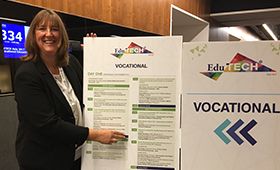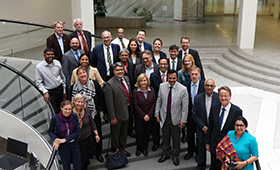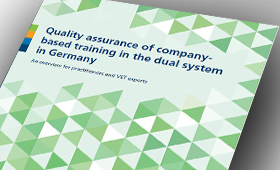
|
|||
Read more BWP Special Edition - VET Trends 2018 Read more Publication as Download (PDF, 13.3 MB) |
|||
|
|||
|
Binding regulations for the validation of competencies acquired by non-formal and informal means are a central component of a permeable educational system. Even though such regulations enjoy political support, implementation is, however, hesitant. In light of the EU Council Recommendation to introduce relevant provisions by 2018 at the latest, this issue of BWP assesses the current status of development, presents some of the approaches adopted and also takes a look at what is happening in neighbouring European |
|||
|
Editorial: From capitalism to talentism - Europe goes dual! Friedrich Hubert Esser, Professor Dr., President of the Federal Institute for Vocational Education and Training (BIBB) In its 2017-2018 Global Competitiveness Report, the World Economic Forum points out that a country's ability to compete is becoming increasingly dependent on its capacity to innovate and that the world is currently making the shift from "capitalism to talentism". For this reason, more and more importance is being attached to well trained and creative workers. As a consequence, the World Economic Forum believes that the countries which will emerge victorious in the competitive markets of the future will be those which adjust to the demands of the Fourth Industrial Revolution whilst at the same time strengthening their political, economic and social systems. Read more Editorial: From capitalism to talentism - Europe goes dual! |
|||
|
Recognising competencies: experts consider scenarios for Germany Katrin Gutschow, Julia Jörgens Following the Council recommendation of 20 December 2012, EU member states set themselves the target of introducing systems for validating non-formal and informal learning by 2018. The intention is that competencies acquired at work, at home, during leisure time and on a voluntary basis are made visible by means of the validation procedure and can be used in the education and training system and in the job market. Such a system is yet to be introduced in Germany. Potential scenarios for the recognition of competencies have been developed and evaluated by experts in a BIBB research project. The article presents initial findings relating to the scenarios and to key aspects of the validation procedures. Read more Recognising competencies: experts consider scenarios for Germany |
|||
|
Does recognition of foreign professional and vocational qualifications also improve labour market opportunities in non-regulated occupations? Stefan Ekert, Ricarda Knöller, Kathrin Raven Formal evidence of educational and vocational qualifications are crucial if skills and competencies are to be usable on the German labour market. It is therefore important for persons who have acquired their certificate abroad to obtain formal recognition of such qualifications in order to enhance their chances on the labour market and therefore also improve their occupational situation. The Federal Recognition Act has served as the framework for this process since April 2012 by according anyone in possession of a foreign qualification the right to a recognition procedure. This article examines the issue of the extent to which recognition of a foreign professional or vocational qualification in a non-regulated area actually improves opportunities for labour supply on the German market and also illustrates the limits which apply. The investigation is based on the results of the evaluation of the Recognition Act. |
|||
|
Validation of non-formal and informal learning in Europe Ernesto Villalba-Garcia Validation of non-formal and informal learning is an important policy tool to promote more permeable educational systems, adaptable to the changing nature of skills demand. It is also a form of giving those most at risk of social exclusion an entry door to the formal education system or to gain employment from skills acquired in non-formal and informal settings. The European Inventory, published in Cedefop's webpage, and carried out in collaboration with the European Commission, has been in place since 2004 and provides an overview of the situation regarding validation in European countries. The article presents an overview of the current situation in Europe using data from the latest update of the inventory of validation on non-formal and informal learning. Read more Validation of non-formal and informal learning in Europe |
|||
|
|||
|
Jessica Erbe Assessment of the equivalence of a qualification acquired abroad with a German reference qualification usually takes place on the basis of documents. The legislation has made provision for cases in which such documentation is not available (in meaningful form). Great hopes are being invested in the so-called skills analyses. However, can this instrument fulfil expectations? This article uses the latest official statistics to be published on the Recognition Act to present the way in which its application has developed over the initial five years. |
|||
|
|||
Read more Boom in the south, slump in the east |
|||
|
|||
Read more Vocational education and training - the key to integration |
|||
|
|||
|
Explanatory videos on dual vocational training and international VET cooperation
Read more BIBB YouTube channel |
|||
|
Delegation from New South Wales visits BIBB
|
|||
|
Education specialists meet for EduTECH Asia in Singapore
Read more Education specialists meet for EduTECH Asia in Singapore |
|||
|
iMOVE-Contact point provides qualifications for skilled workers in Iran The iMOVE Contact Point Iran provides a range of services to support the Iranian-German cooperation in the area of vocational training and continuing education. iMOVE collaborates with over 200 listed German education and training providers. Read more iMOVE Contact point Iran |
|||
|
Tenth meeting of the German-Indian working group on VET
Read more Tenth meeting of the German-Indian working group on VET |
|||
|
Building apprentices' skills in the workplace: Car service in Germany, the UK and Spain
Read more Building apprentices' skills in the workplace: Car service in Germany, the UK and Spain |
|||
|
BIBB Asia-Pacific Networking Event 2017 deepens regional exchange
Read more BIBB Asia-Pacific Networking Event 2017 deepens regional exchange |
|||
|
European Vocational Skills Week - second round
Read more European Vocational Skills Week |
|||
|
|||
|
E-Learning Solutions and Learning with Digital Media
Read more E-Learning Solutions and Learning with Digital Media |
|||
|
Quality assurance of company-based training in the dual system in Germany
Read more Publication as Download (PDF, 2.2 MB) |
|||
|
|||
|
|||
| Imprint | |
|
Bundesinstitut für Berufsbildung (BIBB) Friedrich-Ebert-Allee 114 – 116 Editorial Team: |
|


